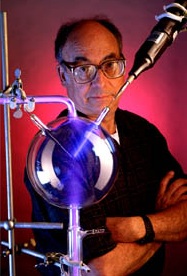
Stanley Lloyd Miller was an American chemist who made important experiments concerning the origin of life by demonstrating that a wide range of vital organic compounds can be synthesized by fairly simple chemical processes from inorganic substances. In 1952 he performed the Miller–Urey experiment, which showed that complex organic molecules could be synthesised from inorganic precursors. The experiment was widely reported, and provided evidence for the idea that the chemical evolution of the early Earth had caused the natural synthesis of organic compounds from inanimate inorganic molecules.

The National Autonomous University of Mexico is a public research university in Mexico. It has several campuses in Mexico City, and many others in various locations across Mexico, as well as a presence in nine countries. It also has 34 research institutes, 26 museums, and 18 historic sites.
Primordial soup, also known as prebiotic soup, is the hypothetical set of conditions present on the Earth around 3.7 to 4.0 billion years ago. It is an aspect of the heterotrophic theory concerning the origin of life, first proposed by Alexander Oparin in 1924, and J. B. S. Haldane in 1929.
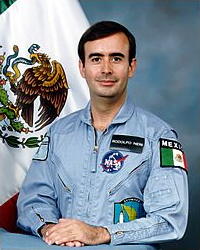
Rodolfo Neri Vela is a Mexican scientist and astronaut who flew aboard a NASA Space Shuttle mission in the year 1985. He is the second Latin American to have traveled to space after Cuban cosmonaut Arnaldo Tamayo Méndez.
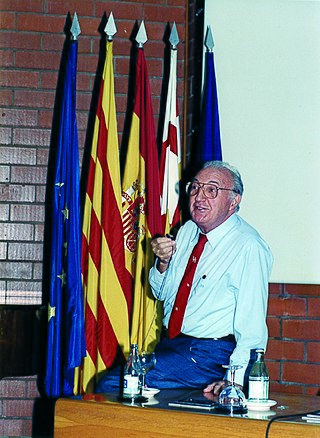
Joan Oró i Florensa was a Spanish biochemist, whose research has been of importance in understanding the origin of life. He participated in several NASA missions, including Apollo mission to the Moon and the Viking lander. He received the Oparin Medal, awarded by the International Astrobiology Society for his contributions to the field of origins of life.
Carlos Alberto Navarrete Cáceres is an anthropologist and writer. He studied history and literature at the Universidad de San Carlos de Guatemala and received his doctorate in anthropology from the National Autonomous University of Mexico. He is the author of books on anthropology and the 2002 collection of annotated essays entitled Luis Cardoza y Aragón y el Grupo Saker-Ti, that deals with the work of Luis Cardoza y Aragón and his participation in a round table organized by the Grupo Saker-Ti.

Antonio Castro Leal was a Mexican diplomat and intellectual.
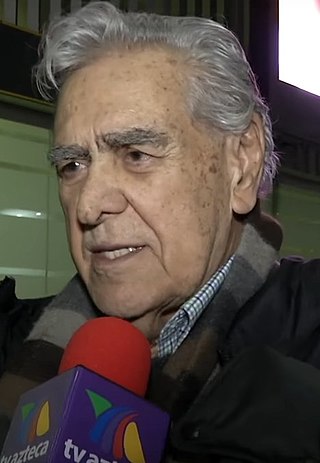
J. Eduardo Eric del Castillo-Negrete Galván is a Mexican actor of theater, film and television who has dabbled as a screenwriter, director and arguer film, beginning his career in the Golden Age of Mexican cinema.
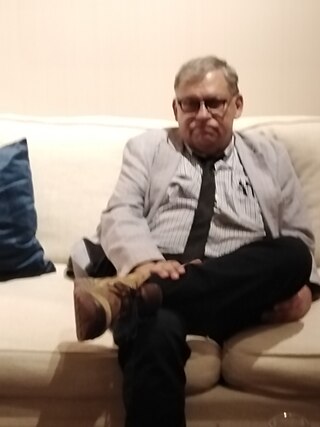
Lauro Zavala is a scholarly researcher, known for his work on literary theory, semiotics and film, especially in relation to irony, metafiction and micro-narratives. Faculty professor since 1984 at Universidad Autónoma Metropolitana, Xochimilco, in Mexico City, where he is head of the area on Intertextual Semiotics.
Alfredo Federico López Austin was a Mexican historian who wrote extensively on the Aztec worldview and on Mesoamerican religion. As an academic teacher, he inspired generations of students, but his influence extends beyond the boundaries of academic life. His sons are Alfredo Xallápil López Luján, well known biologist and informatic and the renowned archaeologist, Leonardo Náuhmitl López Luján.
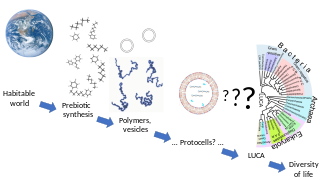
In biology, abiogenesis or the origin of life is the natural process by which life has arisen from non-living matter, such as simple organic compounds. The prevailing scientific hypothesis is that the transition from non-living to living entities on Earth was not a single event, but a process of increasing complexity involving the formation of a habitable planet, the prebiotic synthesis of organic molecules, molecular self-replication, self-assembly, autocatalysis, and the emergence of cell membranes. The transition from non-life to life has never been observed experimentally, but many proposals have been made for different stages of the process.
Nibiru-Astronomical Society is a non-profit academic and student astronomical society created at the Faculty of Sciences (UNAM) of the National Autonomous University of Mexico in 2001.

Alfonso Luis Herrera (1868–1942) was a Mexican biologist, author, educator and founder of several institutions in Mexico City. He conducted research into the origin of life in an attempt to develop a new, experimental science which he called plasmogeny.

Gilberto Owen Estrada was a Mexican poet and diplomat.
Antonio Peña Díaz is a Mexican biochemist who received the Carlos J. Finlay Prize for Microbiology and chaired both the Mexican Academy of Sciences (1992–93) and the Mexican Society of Biochemistry (1981–83).
James "Jim" P. Ferris was an American chemist. He is known for his contributions to the understanding of the origins of life on Earth, specifically by demonstrating a successful mechanism of clay-catalyzed polymerization of RNA, providing further evidence for the RNA World Hypothesis. Additionally, his work in atmospheric photochemistry has illuminated many of the chemical processes which occur in the atmospheres of Jupiter and Saturn's moon, Titan.

Antígona Segura Peralta is a Mexican physicist and astrobiologist. Since 2006, she has been a researcher at the Institute of Nuclear Sciences of the National Autonomous University of Mexico (UNAM) and collaborator at the NASA Astrobiology Institute. As a feminist she actively advocates for the inclusion of women in the exact sciences, mathematics, and engineering. Segura has participated in several activities in and outside UNAM defending women's rights; she was awarded with the 2021 Hermila Galindo medal by the Congress of Mexico City.
The history of research into the origin of life encompasses theories about how life began, from ancient times with the philosophy of Aristotle through to the Miller-Urey experiment in 1952.

Eduardo González Arévalo was a Spanish-born Imperial Mexican General during the Second French intervention in Mexico. He was known for being the Imperial Governor of Tabasco from June 18, 1863 to January 20, 1864 as well as being a major participant of the French intervention in Tabasco.













